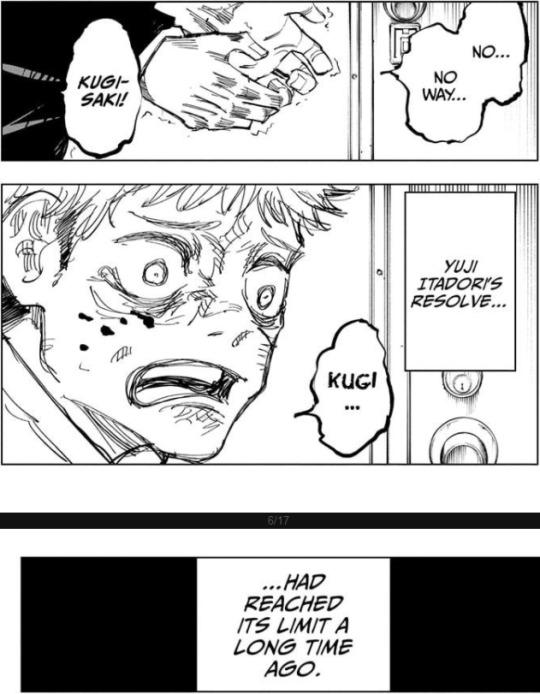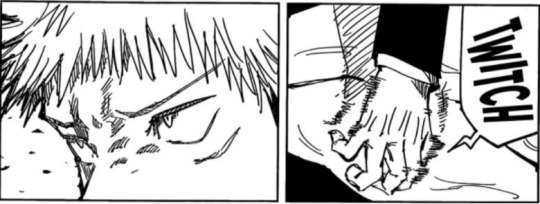#…not the most unhinged shit I’ve seen but it does make question my sanity from time to time
Explore tagged Tumblr posts
Text
If I had a nickel for every time I’ve seen Matpat shipped with a fnaf character I’ve have 2 nickels, which isn’t a lot but it’s weird that it happened twice
#first springtrap x matpat now ness (played by matpat) x mike#…not the most unhinged shit I’ve seen but it does make question my sanity from time to time#and yes I know that the matpat in springtrap x matpat isn’t actually matpat but just some guy named mat#but literally everyone says matpat and not mat the random guy soooo still counts#fnaf#fnaf movie#five nights at freddy's#matpat
67 notes
·
View notes
Text
the horror of jujutsu kaisen
so jujutsu kaisen is possibly one of the most effective horror stories i’ve read in a long time. the way it crafts its horror is really ingenious. i think that horror can be split into a couple categories, each more effective than the last:
shock and disgust -- think jump scares and gore. simple imagery that we eventually get desensitized to
perversion and corruption of something we’re familiar with -- this is the source behind a lot of classic horror imagery, like creepy dolls or evil nuns. the horror of expecting one thing and getting something else, the uncanny valley, a lot of eldritch horror
slow decline of what we consider good and correct -- this is what i’d say is the most effective brand of horror. this is the one where you go downhill along with the horror protagonist, and you start agreeing with the monster by the end. it’s where the lines of what we even consider to be monstrous start being blurred. i’d say that eldritch horror still factors into this, but it’s the root of most psychological horror. think the shining or serial experiments lain.
jujutsu kaisen uses all three to great effect. the gore is really very well done and tasteful, and the best part is that the series feels no need to shock you with stuff that isn’t gore. there aren’t jumpscares (not that it would work in a manga anyway) or god forbid scenes where the female characters get violated. a lot of the curses veer into uncanny valley territory, and the whole concept of transfigured humans is of course literal corruption of something we’re familiar with. but the main draw of jujutsu kaisen is the slow decline of what we consider good and correct, and the way that it accomplishes this is by taking advantage of our -- the reader’s -- expectations involving shonen manga.
jujutsu kaisen is not a typical shonen manga. but it does a very good job of pretending to be, just like that almost-deer in the woods looks like the real thing from 100 meters away before you notice it has a few too many eyes. it’s easy to forget amidst the funny moments and epic fights that you’re reading a horror story and not hunter x hunter or bleach. it’s very effective in subverting stock shonen tropes and not drawing attention to it. a lot of the time, “subversive” media will hit you over the nose with how subversive it’s being just to get the point across. for example, deadpool breaks the fourth wall like it’s a wrecking ball company trying to fill its monthly quota, and as a result the subversiveness actually becomes less effective. the sarcasm and the meta moments stop being as effective over time because you get used to it. it stops being as subversive once it settles into its own status quo. jujutsu kaisen doesn’t address the reader or draw attention to when it subverts shonen tropes, which makes it easier to miss when you’ve been almost betrayed by your own expectations.
an example that i’ve addressed before is sukuna. yes, yes, sukuna sexc, but also sukuna defies just about every single thing we expect when it comes to superpowered evil sides. he doesn’t come out when yuuji is angry, he refuses to work with or befriend him, he only gets more powerful and more evil over time, he doesn’t go berserk when he attacks and rather makes calculated decisions to make things worse, he has his own agenda we don’t even know about, and he’s so charismatic it’s easy to forget just how evil he is. nobody ever draws attention to it, so you don’t realize just how weird sukuna is. he’s an anomaly and that makes him scary. whenever he’s involved everything immediately goes to shit, and the reactions to him of those around him drive home just how horrifying his presence really is. in short, as tvtropes puts it:
Sukuna shows exactly what a a sociopathic unrepentant, ancient evil who's able to back up his ego with the power to match controlling your body would actually be like.
spoilers for the manga under the cut
then there’s the shibuya arc. as horrifying as it is to watch characters we know and love die, i think that the most memorable and scary part of it is yuuji’s decline. it’s something that’s been hinted at from the very beginning, that yuuji is ruthless when it comes to killing curses and has a relatively shaky motivation when it comes to leading people to proper deaths. over time that motivation gets challenged again and again, with yuuji first questioning what a proper death actually is and, once he starts actually killing humans instead of curses, whether he even has the right to consider that his motivation.
yuuji also gradually becomes more and more accepting of death over time, going from being frightened of it to facing it with courage, then accepting of it if it means helping others, to embracing it as his role to play, and finally to wishing it upon himself after sukuna’s rampage. it’s heart-wrenching to watch him break down after being set up as an eternal ball of sunshine who never lets any heartbreak or fear slow him down. and then there’s what happens to nobara kugisaki.

if this was a typical battle shonen manga, this would lead to a rage power-up for yuuji and he would kick mahito’s ass, plain and simple. think of naruto vs pain after hinata got thrashed. it doesn’t. it’s much worse. it doesn’t empower yuuji, it breaks him, and i’d say that this is the last we see of the character we know as yuuji. all he can do is curl up on the ground, but it’s still him. and then todo shows up.
in my opinion, todo actually made things worse with his speech. in terms of the fight against mahito, he successfully got yuuji back into the fight. the contents of his speech weren’t bad either, talking about how giving up would defile the memories of those he’s lost and that he’s been entrusted with too much. but again, it doesn’t really empower yuuji. it gets him to stand up, but it’s like he’s standing on broken bones. this is where a lot of foreshadowing starts coming into play. we’ve seen characters fight and become completely unhinged in their obsession -- that’s not new to us. we’ve seen yuuji do it too.



but this is something else. yuuji starts to resemble sukuna more and more as the fight goes on, in actions and words as well as appearance. he looks... hollow. there’s no expression in his eyes, not even anger. he’s carrying out his duty like a good cog. and he eventually decides that he doesn’t need to find a meaning or a reason to kill curses, in contrast to the way we’ve been told throughout the story that meaning is important for sorcerers, and the way that shonen protagonists are always highly driven by a strong, unshaking motivation.
in other words, we see something we’re familiar with and something we see as good -- yuuji, his motivation, exorcising curses -- turn into something we no longer recognize. or to be more clear, we do recognize it, we just don’t like it. so yuuji starts to look more like sukuna. his motivation is whittled away into nothing. “exorcising” becomes “killing”.
we see yuuji finally decisively beating mahito, but we’re not exactly happy about it. don’t get me wrong, i love seeing that bastard crawling away in fear, but i don’t like that it’s yuuji he’s crawling away from. i don’t like seeing what yuuji has become. it makes my skin crawl thinking about what’ll happen to him from here on out. yuuji, over the course of the shibuya arc, has become the single most terrifying character in the story so far.
and that’s what makes jujutsu kaisen an effective horror story.
there are no heroes, but we like to think that there are, as we desperately try to convince ourselves that these people are good and correct and rock-solid in both their motivations and their sanity.
the only other time i’ve seen this done in a similar way was during the chimera ant arc of hunter x hunter, where gon slowly loses his humanity in exchange for his single-minded goal of avenging kite. but after that arc, gon spent the next arc as a mummy, in other words without any character development. and after he’s healed, he just goes right back to his peppy self without addressing the monster he became like, a week before. i think jujutsu kaisen is going to pick up where the chimera ant arc left off, in a metaphorical sense. i am equal parts terrified and excited to see where yuuji’s character will go from here. i want to know what’s going on with him and sukuna, and i want to see how everyone else will react to how he has changed, et cetera et cetera.
anyway. that’s just my two cents, but i really think that the character-driven horror is much scarier than the gory parts. i could probably talk about gojou too and how absolutely batshit deranged he acts in combat, but i also don’t want to talk about him in principle because he gets too much attention. he deserves to be humbled, lol.
so yeah i really like the shibuya arc
#long post#it's hyperfixation hours baby#i told you guys i could write essays about jujutsu kaisen#i'm going to be late to my next class lmao#i would keep going but i don't think my physics teacher would appreciate it#i think i just like pain#not the character from naruto fuck that guy#but yeah um post-shibuya therapy arc please and thank you gege#jujutsu kaisen manga#jjk#jujutsu kaisen meta#jujutsu kaisen#itadori yuji#itadori yuuji#sukuna#ryomen sukuna#ryoumen sukuna
180 notes
·
View notes
Text
what the world will look like when it’s over
Can’t Get You Out of My Head is the first Adam Curtis documentary I’ve seen. I gather it’s not the most successful demonstration of his method; it sounds like Hypernormalization or The Century of the Self are tighter in their construction, less effortful (count how many times Curtis says something like “But then it started to run out of control” in this one), and perhaps less frustrating in their narration. In the early episodes of this documentary in particular, it feels like Curtis is constantly presenting what’s being covered as the turn, the decisive shift in his narrative—the emergence of the American counterculture, the revolution of the “unit of One” led by Mao Zedong’s wife Jiang Qing to help her break the stalemate with the other revolutionaries in China into which Zedong had fallen in the 1960s, George Boole’s development of Boolean logic to describe human thought. And the whole thing feels longer and baggier than it needs to be. The early episodes devote much time to interesting individual narratives, like that of the Trinidadian British activist or sorts named Michael Freitas (or Michael X) or a trans woman named Julie in 1960s Britain; they also sprawl in a way that makes the overall argument a bit hard to divine. It’s not until the fourth episode that the shape of Curtis’s narrative becomes clear—that our age is the product of a struggle between a new, broadly liberal-democratic and capitalist image of individualism, a dying era of collectivist struggle, and older, more vicious systems of power, derived from the control of capital and expressed through the middle classes’ suspicion and viciousness toward the subaltern and toward each other, even as they remain subject to the power of oligarchs and billionaires.
Curtis also seems to play fast and loose with the facts sometimes. When he presents Médecins Sans Frontières’s founder Bernard Kouchner as an avatar of a theory of the “one world” of liberal democracy—the idea that we’re basically one world of individuals, enjoying certain human rights regardless of political orientations or ideologies, and that Western nations are duty-bound by virtue of their prosperity to intervene when other nations violate people’s rights—it seems a distortion of what Kouchner actually says in the footage Curtis includes: “We don’t care on leftist or rightist countries [sic]; there is no leftist and rightist suffering, and there is no possibility to split the world in[to] ‘good’ people or ‘bad’ people, ‘good’ dead and ‘bad’ dead.” Which isn’t to say Kouchner didn’t believe in liberal-democratic ideas—he may well have—but what he’s shown as saying has to do with the consideration of suffering as suffering regardless of a person’s identity or allegiance, which is a different matter.
This is just one of several moments when I stopped to wonder how secure I actually was in Curtis’s hands. But ultimately, I find the emotional history he lays out resonant. The age we’re living through now, in the 2020s, is indeed the product of certain fantasies of individualism and of a post-end-of-history, neoliberal “one world”—with no ideologies but capitalism and putative democracy—meeting age-old systems of power, acquisition, and control, and age-old features of the human mind and heart: resentment, prejudice, betrayal, jealousy, the need to be prosperous, the need to be free.
And Curtis’s work appeals to me for the same reason the writer Pankaj Mishra’s work does. He historicizes our underhistoricized time. What’s more, he does so in a way that’s especially rare to see in any mainstream media venue. Usually, when you want to understand the connections between, say, colonial-era empires and post-war welfare states, or if you want to understand what happened to turn Western societies as they were post-war to Western societies as they are post-financialization, you have to seek the information out on your own. It’s valuable to have someone in a place like the BBC willing to put the pieces of these narratives together. And willing to remind us of the events that are so incredibly easy to forget even in one’s own lifetime. Abu Ghraib, for instance, which pops up in part 6 of the documentary. That shit happened while I was alive. How often do I remember it? How many American sins get drowned out in the new ones that emerge every day of every month of every year? Or in the stasis that sets in when what was once novel, like the War on Terror or the invasion into our privacy represented by the Patriot Act, fades into regular life?
I was jotting down copious notes while watching the doc, as is my wont. The questions and thoughts that came up, in no particular order:
How do the elites of a given era impose their preferred ideologies? How are the structures of power we grow up with constructed, and how do those go on to shape our behavior?
Control, as it’s practiced by societies in the 21st century, often comes down to the recognition of patterns in human behavior—and their manipulation.
The loss of power, like that which was suffered after the collapse of Britain’s empire or in the slow hollowing-out of America’s manufacturing industry in the 20th century, leads to anger and melancholy that people can’t be expected to abandon. Does doing what you’re supposed to do bring you the happiness you were promised—or anything even resembling that happiness? When we’re living in a historical moment in which the answer is no, as is often the case today, we’ll need to watch out. It’s a sign people are being manipulated and abused.
Over time, the tech industry has come to understand that you can manage people en masse by collecting their data and manipulating the messages they receive in social media activity feeds and advertising—and you can make them feel like sovereign individuals at the same time through the very same means. In light of all this, will there ever be a revolution that actually changes the structure of power we’re currently stuck in? Is there a chance to alter this extreme individualism. on the part of people who are surrounded by political systems so enervated, by the supra-governmental system that is global finance capital—which politicians can’t control, and must appease and palliate—that they can’t respond to phenomena like climate change or meaningfully punish atrocities like wars prosecuted on false pretenses? Or are we stuck where we are, in a world that’s corrupt and exhausted? In nations whose governments depend on technologies of surveillance and myths of consumerist abundance or nationalist glory to maintain power, in the absence of any real vision for the future?
It all leads to some interesting takeaways. For one, the way culture reacts to politics and vice versa. As I was watching Can’t Get You Out of My Head, I was reminded of a conversation folks on the Discord server for the Relentless Picnic podcast had had recently about the strange things Richard Dawkins posts on his Twitter account. And it led me to think: when religious “caring conservatism” was in the White House, Richard Dawkins and his New Atheism, this brash repudiation of religion and its pieties, grew as a counterweight. When Obama and his technocratic regime were in power, with social media bringing on a wave of progressivism in popular culture and algorithms presenting us a fantasy of endless choice—much of which was a thin veneer over the same old shit: banks getting bailed out, forever wars going on, productivity rising while wages stagnated—we also got Jordan Peterson-types who claimed to speak to a human need for narrative, even in this point of stability we had seemed to reach, this recovery of sanity after the chaos that was the Iraq War and the financial crisis; who claimed we needed ideas and myths to animate and drive our lives, because they sensed there was something hollow and mendacious driving all this consumer choice, for all it seemed a symbol of our freedom and progress.
Of course, both Peterson and Dawkins are provocateurs, not intellectuals; I don’t mean to dignify the movements they led much, since in both the appearance of intellectual rigor or moral clarity often covered the indulgence of the worst instincts: immaturity, obstinacy, provocation for provocation’s sake, contempt for women and trans people. The New Atheists had a point, and could be absolute assholes about it; they ultimately could be as fundamentalist and dogmatic as any religious people. As for Jordan Peterson, his actual work, in the way of so many grand theorists, uses the appearance of profundity to cover something ultimately pretty banal. And he’s most known for grandstanding in the public sphere—refusing to use people’s pronouns, the usual conservative shit. But these movements do seem to reflect a countercultural response no less than 1960s counterculture reflects a reaction to the staid culture of 1950s America and the sins it covered up.
Which leads me to the question: what was the culture’s response to Trump’s administration? Maybe QAnon and Russiagate, as conspiracies—that is, actual narratives people inhabit to explain the world’s evils, and not just a vague need for them that they satisfied with Jordan Peterson’s light form of Stoicism or his theories of Light and Dark or whatever the fuck. And in that way, perhaps, once a countercultural movement—namely nationalism and Trumpian populism—actually seemed to have overthrown a regime, of Obama-era liberal technocratic management, culture and politics came to mirror each other, rather than standing in opposition to each other. Both became equally conspiratorial and unhinged; in fact, they merged. All the ruling myths and conspiracies mutate in kind these days: Trump’s garbage about draining the swamp, a cover for Trump and his family enriching themselves and Stephen Miller’s like getting to fashion the state they wanted, becomes QAnon’s garbage about rings of child trafficking and pedophilia and Trump, of all people, being their savior—all while actual trafficking and abuse perpetuated by Jeffrey Epstein and his ilk goes unpunished, Epstein’s death swallowed up by the state without a sound—becomes the liberal pundit class’s screaming about Russia: connections between Trump and Putin that were always conjectural to me, because no one who pled them seemed to feel much need to substantiate them.
Here again I feel like what were once centrifugal forces in our culture—between mainstream and the independent media, for example; between people in power and their critics, either in the media or at society’s margins—have collapsed into a single morass. We’re all in hell and there’s no way out.
In all this, what does Biden’s administration represent? Little more than an interregnum, to my mind. How disappointing to see not even a gesture toward forgiving student debt or raising the minimum wage in these first 100 days of his presidency. There’s been some progress in climate legislation, and progress in putting Stephen Miller’s deportation machine to a halt (though they’re also reopening several emergency shelters to accommodate more minors already being held past the mandated limits for keeping them in the custody of the Department of Health and Human Services’s Office of Refugee Resettlement). But there’s also been such triangulation on policy by the administration and its supporters and such complacency on the part of the media covering the administration, refusing to call them out on or even cover this. And how can the average voter respond but with resignation?
Ever since I read Thomas Mann’s Doctor Faustus near the start of lockdown, absorbing the picture of the world pre-World War II that’s presented in that book, I’ve thought we’re in the same sort of moment that Mann’s protagonist Zeitblom was in. There’s a crisis that’s passing over this whole planet like a wave or a seismic event, and no human intervention can interrupt it. We can only wait for it to pass—holding on to whatever’s to hand, waiting to see what the world will look like when it’s over.
#adam curtis#documentaries#thomas mann#jordan peterson#richard dawkins#pankaj mishra#the relentless picnic#conspiracy
28 notes
·
View notes